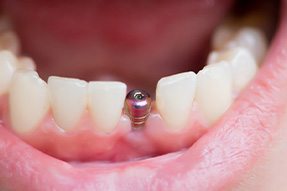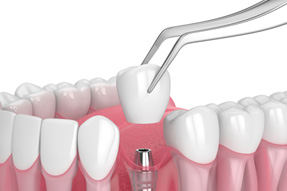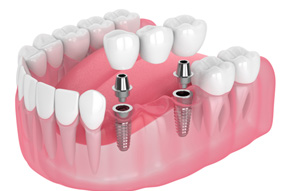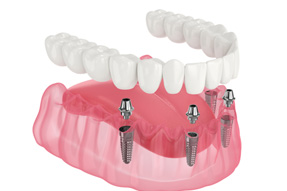Dental Implants – Dallas, TX
Rebuild Your Smile and Enjoy Life Once More

Even just having one missing tooth can negatively affect your oral health, as well as your appearance and self-image. Fortunately, no matter how many of your pearly whites are missing, they can be replaced with dental implants! Long considered the gold standard of tooth replacement, dental implants can replace the entire structure of a missing tooth, from its roots to its crown—and the end result is beautiful, functional, and notably resilient. If you’re ready to address your tooth loss with perhaps the best solution around, continue reading below to learn more about dental implants and how Dr. Greer can help you rebuild your smile and enjoy life once more!
Why Choose Dale W. Greer, DDS for Dental Implants?
- Friendly & Experienced Staff
- Insurance Accepted and Financing Available
- Advanced Technology for More Precise Care
What Are Dental Implants?

Dental implants refer to small posts that are surgically embedded into the patient’s jawbone, which function as replacement “roots” for the missing natural teeth. Made from biocompatible materials, these implants are capable of healthily fusing with bone matter to provide a lasting, sturdy foundation for the replacement teeth. Once the implants have fused with the patient’s jawbone, lifelike replacement teeth can be added into the picture, setting patients up for several decades of optimal oral functionality and unparalleled beauty.
The 4-Step Dental Implant Process

Since placing dental implants requires a special multi-step process that spans several months, it generally takes significantly longer to get them than traditional restorations like dentures or bridges. However, implants deliver a range of long-term benefits that make them well worth the effort. Dr. Greer is proud to carry out the entire dental implant placement process in-house at our Dallas office. While placing these appliances is unique for each patient, you can expect to go through four steps. Here’s a brief overview of the placement process, but please get in touch with our staff if you’d like to know more.
Initial Dental Implant Consultation

During this initial visit, we’ll provide you with all the information you need concerning your treatment plan, including how many implants are needed, where they must be placed, and what preliminary procedures (if any) are necessary beforehand. Some patients may need periodontal therapy to clear up gum disease, bone grafts to reinforce their jawbones, or restorative work to resolve tooth decay before they can receive implants. Once your mouth is in suitable shape, we can make plans for the next step of the process.
Dental Implant Surgery

Implant placement is an oral surgical procedure that Dr. Greer can complete in-house so that his patients don’t have to worry about dealing with an outside specialist who uses a different pricing structure. The procedure itself is straightforward and rendered painless by a local anesthetic, and you may receive sedation treatment to help you relax if necessary. Once your comfort is assured, Dr. Greer will make a small incision in the gums, insert a titanium post in the jawbone, close the wound, and place a protective cap over the appliance.
Dental Implant Osseointegration & Abutment

Your implants will need a few months to fuse with your jawbone. This natural process called osseointegration is the single most important factor concerning dental implant success, and you’ll want to follow your dentist’s instructions closely during this time. Once the titanium posts are adequately fused with your jawbone, you’ll come back to our office for a minor oral surgical procedure to place an abutment piece on top of your implant. While you are healing over the next several weeks, your final restoration will be crafted based on detailed measurements taken of your mouth.
Delivery of Dental Implant Restoration(s)

The final step is to attach your lifelike replacement teeth to your implant posts after they’ve fully fused with your bone. When your completed permanent dental crown, bridge, or denture arrives at our Dallas office, you’ll come back for another appointment so Dr. Greer can secure it in your mouth and make any final adjustments. Once each piece is in place and working well, you’ll be ready to show your newly completed smile to the world.
Benefits of Dental Implants

Many experts consider dental implants ideal for restoring missing teeth because of their unique strength and stability. Of all the possible solutions for tooth loss, they’re the only ones that include a titanium rod embedded into your jawbone. As a result, they provide several advantages over alternatives like dentures and dental bridges.
Continue reading to learn about some of the many benefits of these replacement teeth and feel free to contact us for more information.
Day-to-Day Benefits

Gaps in your grin can make once-basic tasks, like eating, speaking, and smiling confidently, much more challenging. Your dental implants can enhance your daily quality of life by:
- Improving chewing power. These teeth can return 80% or more of your original bite force so that you can enjoy all your favorite meals.
- Boosting your confidence. They’re capped with a lifelike dental crown (or other appropriate restoration) made from tooth-colored materials that are customized to look just like your natural teeth.
- Easy maintenance. Keeping them in good shape is as easy as brushing and flossing twice daily and visiting our team every six months for a routine checkup and cleaning.
- Providing security. These are the only replacement teeth that function as sturdy standalone structures, so you don’t have to worry that they’ll become destabilized or dislodged like dentures or dental bridges.
Health Benefits

Not all of the benefits of dental implants are so immediately obvious. For instance, your new teeth can also contribute to your dental condition and improve your health by:
- Preserving your jawbone. The metal rod in your jaw functions like the root of a tooth to keep it active, which can slow or stop the bone degeneration that happens when teeth go missing. This ensures your mouth has a firm foundation to hold everything in place.
- Preventing dental problems. Because it’s easy to keep them clean, you’re less vulnerable to common oral concerns like tooth decay or gum disease.
- Avoiding sensitivity. Dentures rely on a firm suction against your gums to remain put, which can cause friction and sores that you don’t have to worry about with implants.
- Improving diet. You can eat a wide variety of wholesome foods to support your dental and overall well-being with your new teeth without worrying that they’ll be yanked or pushed out of place.
Long-Term Benefits

These prosthetics fuse with your jawbone and essentially become a permanent part of your smile, so you can enjoy these long-term advantages for years to come:
- Reliable outcome. Implants have an incredibly high success rate of 90% or more up to 10 years from their initial placement for a treatment you can trust.
- Resilient materials. These restorations are made from customizable materials that can last decades if cared for correctly so you don’t have to worry about frequent repairs or replacements, like with dentures and bridges.
- Pay for themselves. There’s no need to invest in additional adhesives, soaking solutions, or other accessories to keep implants in place. Plus, they are more durable than the alternatives, so you’re less likely to require costly treatments over time to mend them.
Who Dental Implants Can Help

Are you considering dental implants in North Dallas? If so, we have good news: they are suitable for a wide variety of patients, including those who are missing all of their natural teeth. To find out if this is the best tooth-replacement solution for you, schedule a consultation with us so we can learn about your dental needs and smile goals. You can also read on to learn more, including what qualities we look for in a good dental implant candidate.
Who Is a Good Candidate for Dental Implants?

The ideal candidate for dental implant surgery possesses adequate oral health and doesn’t suffer from periodontal disease. It’s also important that a patient has enough present jawbone density; otherwise, the implants won’t be able to fuse via osseointegration successfully. Fortunately, if a patient is found to be lacking in one of these departments (or has some other issue preventing them from being an eligible candidate), dental implants don’t have to be ruled out entirely. In fact, these issues can be remedied before a treatment plan is put into action!
Missing One Tooth

While dental bridges can effectively replace one missing tooth, there’s a considerable downside: it requires the teeth surrounding the gap to be altered. A single dental implant, on the other hand, can be placed between two healthy teeth without disturbing them at all. Then, a custom-made dental crown will be secured on top, providing you with a complete, healthy, and beautiful smile again.
Missing Multiple Teeth

If you are missing multiple teeth, there are a few ways we can rebuild your smile. The first is with an implant bridge and the second is with a partial implant denture. Both get their strength from your jawbone (unlike traditional restorations that lean on the surrounding teeth or gums for support). In other words, dental implants have a lot to offer in terms of stability and, since they’re attached to the implants, your remaining natural teeth are left alone.
Missing All Teeth

Are you missing all of your teeth? If so, you’ll be happy to hear that even extensive tooth loss is no match for dental implants. In this case, multiple implant posts can be used to support a full denture. This grants it much more stability than a removable denture, and it also grants the patient drastically improved bite force. So, if you are ready to have a complete smile, improve your oral health, and eat a more varied diet again, don’t wait – schedule a consultation with us to learn more about implant dentures!
Maintaining & Caring for Your Dental Implants

One of the many reasons so many patients choose dental implants is because they can last for 30 years or more. The key is proper care and maintenance. If you’re not sure where to start (or you need a quick reminder), this next section is for you! Below, we’ve covered everything you need to know – from how to take care of your smile at home to the importance of coming to our Dallas dental office every six months for a checkup.
Make Oral Hygiene a Priority

While your dental implants cannot decay, any remaining teeth you have still can. Not only that, but your gums will develop an infection if you don’t take good care of them. Since peri-implantitis (a form of gum disease) is one of the leading causes of dental implant failure, it’s crucial that you incorporate healthy habits into your daily routine, like brushing twice a day and flossing once a day.
Eat a Healthy Diet

Although delicious, raw almonds, hard pretzels, and other crunchy foods can damage your dental implants and your teeth. That’s why we recommend avoiding them or, at the very least, exercising extreme caution when eating them. It’s also important to cut back on sugary and starchy foods while increasing your intake of nutrient-dense ones, like cottage cheese, scrambled eggs, plain yogurt, and bananas.
Break Bad Habits

Just like your natural teeth, your dental implants aren’t indestructible. That’s why it’s so important to avoid doing anything that could lead to significant damage, like smoking, chewing on ice cubes, or biting the end of your pen/pencil. Additionally, you shouldn’t use your teeth as tools – whether it’s to remove plastic wrapping or trim your nails.
Protect Your Dental Implants

Do you like to stay active? Whether it’s by playing tennis, riding your bike, jogging, or lifting weights, you should wear a mouthguard. That way, your teeth are protected from unforeseen impact. If you don’t have a mouthguard already (or you’re using one that you purchased at a sporting goods store), let us know so we can have a custom one made for you.
Schedule Regular Dental Checkups

One of the biggest misconceptions about dental implants is that – once you have them – you don’t need to schedule routine checkups and cleanings. That’s not the case! In fact, these routine visits play a crucial role in catching oral cancer, loose restorations, tooth decay, and gum disease in the early stages. So, it’s important that you make your biannual visits to our office a priority!
Understanding the Cost of Dental Implants

When it comes to getting the best in life, you very often get what you pay for, and this includes restoring your smile. Dental implants are a long-term investment in your health, confidence, and quality of life, and one that will pay dividends with time. This highly customized treatment will vary from patient to patient, so prices can vary dramatically depending on your individual needs. Dr. Greer wants you to feel confident in your choice, so he and the team will always ensure that you’ll know an estimate of your cost before any work begins, and we will do our best to make your treatment as affordable as possible. While we understand that dental implants are more expensive than other replacement options, their benefits are well worth the investment. In fact, because they’re likely to last you a lifetime, they could actually be the most cost-effective solution in the long run.
Preliminary Treatments & Dental Implant Surgery

Preliminary treatments such as gum disease therapy, tooth extractions or bone grafting will add to the overall cost of your dental implant treatment. Although these will increase the price, they are vital procedures for maximizing the success of your new smile. Thankfully, most of these procedures are at least partially covered by many dental insurance plans.
Your dental implant surgery will incur its own cost and must take into account where your implants will be placed in the jaw, and which type of sedation or anesthesia you’ll need. Because Dr. Greer places your dental implants in-house, you won’t need to worry about working with an outside surgeon or paying for a separate team for your surgery.
The Parts of Your Dental Implant

There are several factors that affect the cost of your dental implant, including:
- Number of dental implants: One dental implant for a single missing tooth will cost less than four to six for an implant denture, but an implant denture is much more cost-effective than replacing each tooth on an arch separately.
- Type of restoration: Each type of restoration has a different cost. Generally speaking, the smaller the less expensive.
- Size or material: Some implants are made longer or shorter depending on their placement within your jawbone, and some are made of zirconia instead of titanium, all of which will affect the cost.
- Brand of dental implant: Much like car or television brands, different manufacturers make different dental implants to cater to unique needs.
How Dental Implants Can Save You Money/ How Dental Implants Pay for Themselves

Often, patients are tempted to choose dentures or dental bridges over dental implants because they are more affordable initially. However, the one-time cost of dental implants could ultimately be more cost-effective because you won’t need to pay for replacements or adjustments every 5 to 10 years like you do with dentures and dental bridges. You also won’t need to spend money on special pastes, cleaning solutions, or adhesives to care for them.
Furthermore, because your dental implants won’t wear down your teeth or irritate your gums and are much easier to keep clean, they’ll help you prevent oral health problems like gum disease, tooth decay, and jawbone deterioration and their associated costs. Studies even show that good oral health will lower your risk of systemic issues and the costs of treating them.
Does My Dental Insurance Cover Dental Implants?

Although dental insurance does not typically cover dental implants, there are sometimes exceptions. Our team is happy to review the details of your plan, as we have many years of experience maximizing benefits. Portions of your treatment could likely be covered, such as a percentage of your final restoration or preliminary treatments.
Making Dental Implants Affordable

In addition to welcoming dental insurance, Dr. Greer is also pleased to accept payment plans through CareCredit, which is a trusted, third-party financier that can help make your dental implant treatment more affordable by breaking up the cost into multiple, low-to-no-interest monthly payments.
Dental Implant FAQs
Does Getting Dental Implants Hurt?
Your mouth will be numbed with a local anesthetic before the procedure begins, and your jawbone doesn’t have very many nerve endings. You will also most likely be sedated during the procedure, so you shouldn’t feel any pain during the surgery. However, your mouth may be sore for a few days afterward. By taking all of your prescribed and recommended over-the-counter medication as directed, as well as using cold compresses, you should be able to manage any discomfort. If it worsens instead of improving after two or three days, give us a call so the issue can be addressed.
Will I Have to Take Off Work for Dental Implant Surgery?
Most patients only need to take one or two days off work to get dental implants, but every case is different. It is important to consider how many dental implants you’re getting and the complexity of the procedure. If your job is physically demanding, you may want to take at least three or four days off to allow the site to heal more efficiently, as heavy exercise can divert blood from the implant site and delay healing. Dr. Greer will be able to give you a more specific recommendation based on your individual case.
Do Dental Implants Feel Natural?
Once the dental implants are placed in the jawbone, they should feel just like the roots of your natural teeth. The implants themselves do not have any nerve endings, so all sensations that you feel in the area, like heat, cold, and pressure, come from the gums surrounding the implants. During the osseointegration process, the implant will fuse to and become one with the jawbone, so it will feel perfectly natural.
Can I Get Dental Implants If I’m Diabetic?
If your diabetes is under control, the odds of dental implant success are comparable to those of nondiabetic patients. Uncontrolled diabetes can slow down the healing process, making it more difficult for your implants to integrate with your jawbone. If you are looking to get dental implants as a diabetic, talk to your endocrinologist or primary care physician about getting your diabetes under control beforehand.


